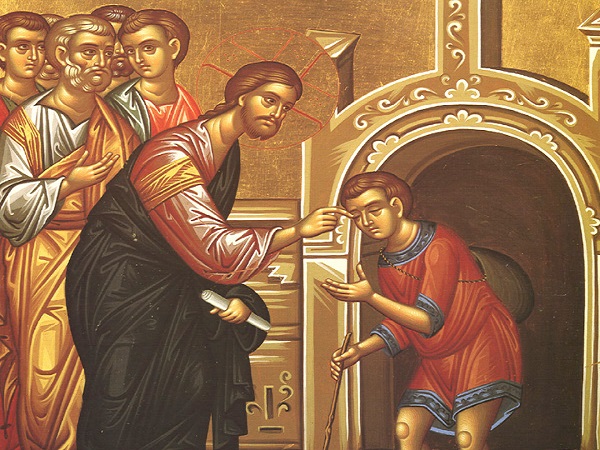The Blind Man in Jericho
24 January 2022Today’s Gospel tells us of the miracle of the cure of the blind man in Jericho. This man was not only blind, he was also poor. This is why he begged. ‘He sat at the side of the road, begging’, as the text says. Where he was sitting, he could hear the noise of the people passing by and wondered what was going on. He was told that it was Jesus from Nazareth. But why were there so many people with Christ? The feast of the Passover was approaching and Christ was on his way to Jerusalem, after leaving Bethany where he had raised Lazarus. But lots of other people were also going to Jerusalem, as large groups of pilgrims, and they’d met up with Jesus. This is why, when the blind man heard the noise, he says: ‘What’s happening?’. What was the noise he was hearing? So it was that a great many people witnessed the miracle of the blind man’s healing.

When the man heard that Jesus was in the crowd and was passing before him, he ‘cried aloud’, like a trumpet, as it were. And what did he say? He entreated Christ to make him well, but the way he did so sent a powerful message. Whereas the people who were there told him in general terms that the man who was passing by was Jesus from Nazareth, the blind man addressed him as ‘Son of David’. He cried aloud and said ‘Jesus, Son of David, have mercy upon me’. When he called Jesus the ‘Son of David’, the blind man was acknowledging him as the Messiah. Because the Messiah would be a descendant of David’s. ‘Messiah’ is the equivalent word for ‘Christ’. In other words, what the blind man was actually saying was: ‘Jesus Christ, have mercy upon me’. It’s the prayer that the holy Fathers have taught us to say, based on many points in the Old and New Testaments: ‘Lord Jesus Christ, have mercy upon me’. We must say this prayer, my brothers and sisters, we must say it. It has vast power. It was through this prayer that the blind man in today’s Gospel was cured. Indeed, the reading tells us that the other people rebuked the blind man and told him to be quiet when he was shouting this prayer, but that he continued to shout all the more: ‘Son of David, have mercy upon me’.
Our Lord Jesus noticed the blind man who entreated him, with faith, to have mercy on him and came to a halt. The text says ‘he stopped’. This is very important and worth noting. Jesus was stopped by the ‘voice of one crying aloud with faith’, says Cyril of Alexandria. Christ then told the others to bring the blind man to him, and asked him what he wanted of him. Christ asked, not because he didn’t know what the man wanted, but so that the onlookers wouldn’t think that the man wanted one thing and received another. When the man told him that he wanted to be able to see, Christ told him ‘Open your eyes’. And he also told him: ‘Your faith has saved you’. What faith? The faith which confessed that Christ is the ‘Son of David’, that is, the true Messiah who was announced by the prophets. The blind man opened his eyes and was able to see. He was so thankful that he followed Christ and glorified God. And he was not alone, because as the holy Gospel tells us, ‘all the people, when they saw this, rendered praise to God’.
According to Theofylaktos’ patristic interpretation, the blind man in today’s Gospel is an image of the Gentile Christians, which is why he was cured ‘at the side of the road’, because in the first place Christ came for Israel, not the Gentiles. But, as we heard, the blind man heard about Christ from the noise made by the crowd. In the same way, the Gentiles gained their faith in Christ by hearing the message of the Apostles. Moreover, we also hear in the reading that the crowd rebuked the blind man, telling him not to shout or say Christ’s name. These are the persecutors and tyrants, who wanted then and want now to silence the Church so that it doesn’t confess the name of Jesus. But our Church is never silenced; indeed, when it’s persecuted it confesses its faith all the louder, like the blind man in today’s reading.
And there’s also, my brothers and sisters, spiritual blindness, blindness of the nous, from which we all suffer, to a greater or lesser extent. To effect our healing from this blindness, let us call out to Christ and entreat him to have mercy on us and cure us. And if anyone should hinder us and tell us not to do so- it’s the devil who stands in our way- let us say with even greater persistence: ‘Lord Jesus Christ have mercy on me’.






